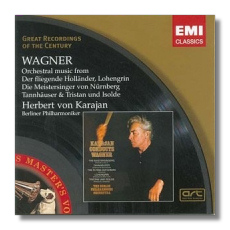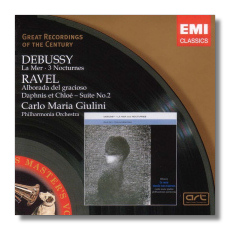
The Internet's Premier Classical Music Source
Related Links
- Latest Reviews
- More Reviews
-
By Composer
-
Collections
DVD & Blu-ray
Books
Concert Reviews
Articles/Interviews
Software
Audio
Search Amazon
Recommended Links
Site News
 CD Review
CD Review
Great Recordings of the Century

- Richard Wagner:
- Die Meistersinger von Nürnberg: Prelude to Act One
- Tannhäuser: Overture and Venusberg Music
- Lohengrin: Preludes to Act One and Three
- Der fliegende Holländer: Overture
- Tristan und Isolde: Prelude and Liebestod
Berlin Philharmonic Orchestra/Herbert von Karajan
EMI Great Recordings of the Century 7243 562756-2 ADD 77:42


- Claude Debussy:
- La Mer
- Nocturnes
- Maurice Ravel:
- Alborado del gracioso (Miroirs, #4)
- Daphnis et Chloé – Suite #2
Philharmonia Orchestra & Choir/Carlo Maria Giulini
EMI Great Recordings of the Century 7243 562746-2 76:57 ADD
Neither Richard Wagner nor Herbert von Karajan often hid their light under a bushel; small wonder that the conductor was so persuasive when he led the German composer's music. These recordings were made in 1974, when Karajan was in his mid 60s. It would be hard to find Wagner playing that is grander or more resplendent than this. Karajan was in his element here, and the Berlin Philharmonic was a brilliant yet supremely malleable instrument in his hands. One can criticize him for his almost egomaniacal concern for beautiful orchestral sound per se, but he seemed to conceive of music as banquet at which the food could never be too rich or too plentiful. Perhaps this approach makes Nuremberg's Mastersingers sound a bit too pompous for their own good, but there's no denying the spiritual elevation of the Act One prelude to Lohengrin or the transcendent eroticism of Tristan. In Tannhäuser, Karajan captures the opera's lofty ethical tone without shortchanging the very real attractions of Venus and her cohorts! In short, those who like their Wagner severe will recoil at Karajan's sensuality, but it's hard to argue with playing this strong and luxurious. It's like a Rubens painting. The engineering is top of the line.
It's a habit of mine – quite possibly a bad one – to compare recordings of La Mer to specific bodies of water. True to his Italian heritage, Giulini's La Mer is warm and bright, like the Mediterranean on a day in July. The ocean's power and incipient threat are subsumed in a reading that is pleasantly pictorial – a postcard from the Riviera, if you will. (Unsurprisingly, the last movement is the least effective.) Giulini brings out the inner voices, which makes this a recording to try if you are following along with the score. Similarly, "Nuages," the first of the three Nocturnes, is given unusually definite outlines, and the music loses some of its mystery. "Fêtes" is almost harshly brilliant, and the "Sirènes" are attractive – some beautiful choral timbres are achieved – but not necessarily seductive. Turning to Ravel, the Alborado del gracioso features stunning playing from the Philharmonia – those repeated notes are a wonderment. The Daphnis et Chloé suite needs a richer orchestral sound (or more lustrous engineering) to make an ideal effect, and Giulini has to make do without a chorus in the "Danse générale." The Debussy items were recorded in 1962; the Ravel works are from 1959. My minor complaints aside, however, this CD merits inclusion in the "Great Recordings of the Century" series, in which the Wagner disc is also included.
Copyright © 2004, Raymond Tuttle


















